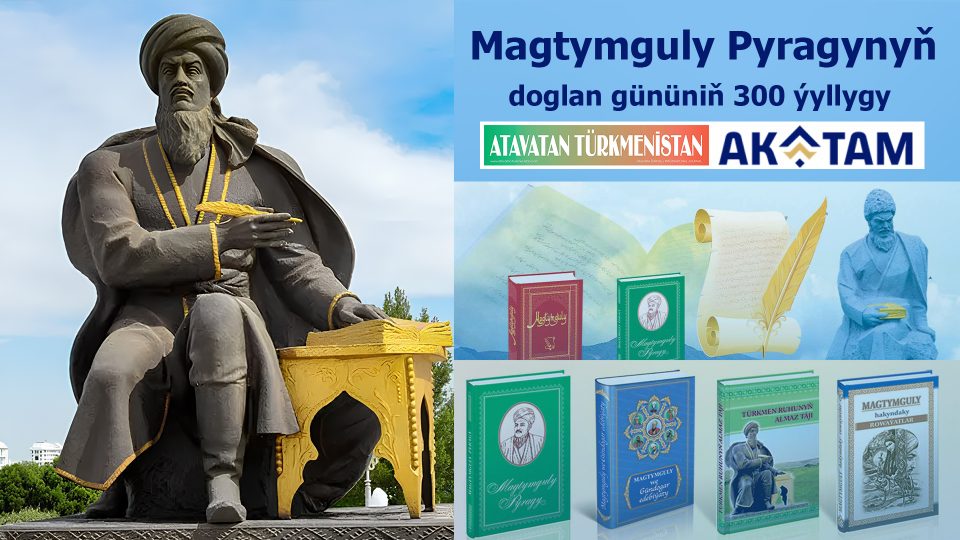I remember it as if it were today. While I was in the 9th grade of school, I stood at the blackboard during a lesson on Magtymguly’s works, responding to questions. Our Turkmen language and literature teacher, Annageldi Durdyyew, suddenly asked me an unexpected question.
In which countries are Magtymguly’s manuscripts kept?
I don’t remember where I heard it, but I answered without hesitation.
Great Britain.
The teacher was satisfied with my answer.
After finishing middle school and focusing on studying Magtymguly Fragi’s legacy, I became very interested in his manuscripts preserved in various countries around the world. However, the moment I stood answering in that school class remained forever in my memory, nurturing a desire in my heart to see the great scholar’s manuscript in England.
They say if you truly wish for something, it will come true. In 1992, I traveled to that country to participate in Magtymguly’s poetry days at the invitation of the “Friends of Magtymguly” society in Great Britain, with my main wish being to see the manuscript in the British Museum. I thought to myself: “What a fortune! This is finally happiness!”
Thanks to the efforts of our friend living in England, Dr. Yusup Azmun, I found myself in the British Museum in the heart of bustling London. Fate had it that an experienced scholar, who had converted to Islam and taken the name Muhammet Isa Weyli, fluent in Russian and intimately familiar with the Eastern section, was leading me.
Taking the manuscript in my hands, I touched it to my face three times. Thus began my acquaintance with the manuscript.
The original owner of the book was an Iranian Turkmen named Gylychmuhammet Ownuk, who had given this precious manuscript to a Russian man named Denisow. Thus, the manuscript had arrived here on February 10, 1934 – 90 years ago.
It’s important to note that this manuscript is not an original written by Magtymguly himself but a copied version.
The manuscript has been restored, covered in dark blue fabric, sturdy material. Its inner pages are made from a blend of silk and hemp fibers. Despite being old, the writings in black ink on its pages have retained their clarity.
On the second page of the book, written in the old Turkmen script, it says, “Repenting for sins, respecting guests, repaying debts, and burying the deceased are obligatory duties.”
The manuscript concludes with Magtymguly’s poem “Turgul diýdiler”. The manuscript has been copied by various scribes over different periods, evident from the distinct styles of handwriting.
The following religious-themed poems by the poet«Dünýä, heý», «Haky çün», «Gelse gerekdir», «Nuksana gelgeý», «Batdy, ýaranlar» continue on the pages sequentially. After these poems, the handwriting changes, but the paper remains the same.
Poems such as «Bagyşla bizni», «Öňi-ardy bilinmez», «Depe nedir, düz nedir», «Göze myhmandyr», «Är ýanynda bellidir», «Ýeldim tut», «Köýmän ýigide», «Kylgyl namazy», «Bir alladyr» indicate that they were transcribed by a skilled scribe from the Iranian side.
Noteworthy is the manuscript containing verses that vary slightly from the versions that have reached our time. For example, the line in the poem «Göze myhmandyr» in the manuscript appears as “From yellow oil a black stone chosen eye” instead of “From black stone a black stone chosen eye.”
Such variations are found in several other places in the manuscript. At the end of the book, the poet’s «Ata meňzär» we «Bilal bar» poems are included.
This valuable manuscript also includes poems by Sheydayy, Shabende, Talyby, Zelili, Seydi, Dowletýar, Yomut Ozbek, Bende Myrat, and Talyby alongside Magtymguly’s works.
Some prayers are written on one side of the manuscript’s final page.
… And so, the time allotted for me to acquaint myself with the manuscript came to an end. I left feeling as though I had met the wise sage himself in a distant land.
These wonderful moments have remained in my memory as some of the most delightful and unforgettable moments of my life.
Atamyrat SHAGULYYEV.
Note: To celebrate the 300th anniversary of Magtymguly Fragi’s birth and to inspire young people to create profound works dedicated to the wise poet, the international journal “Atavatan Turkmenistan” announces a creative competition entitled. This creative event is conducted using the capabilities of Artificial Intelligence and is supported by the “Ak Tam” Economic Society.
Additionally, you can read this article in Turkmen, English, and Turkish on our website. Using Artificial Intelligence, we will prepare a special video and broadcast it to a global audience via the “Atavatan TV Youtube” channel and the www.atavatantv.com website.

